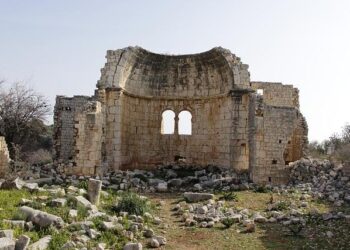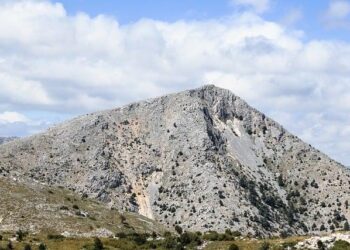Iran and Turkiye: Old Rivals, New Fault Lines
As regional dynamics in the middle East continue to shift, the historical rivalry between Iran and Turkiye has resurfaced, revealing new undercurrents and complexities that threaten to reshape their interactions. Spanning centuries, the relationship between these two nations has oscillated between periods of intense competition and sporadic cooperation, influenced by ideological differences, geopolitical interests, and external pressures. Today, both countries face a myriad of challenges ŌĆö from economic sanctions and political instability to the persisting implications of conflicts in neighboring regions. As they navigate these turbulent waters, the emergence of new fault lines has redefined their rivalry, illuminating the multifaceted nature of their interactions and the potential for both confrontation and collaboration. This article delves into the historical context of their relationship, examines the forces driving their current positions, and explores the implications of their evolving rivalry for the broader Middle Eastern landscape.
Iran and Turkiye Historical Context and Rivalry
The historical rivalry between Iran and Turkiye can be traced back to the imperial ambitions of both nations, rooted in ancient empires such as the Persian and Ottoman Empires. Throughout history,their interactions have oscillated between conflict and cooperation,shaped by mutual suspicion and overlapping cultural identities. Both nations have sought to expand their influence in the region,often finding themselves at odds over territorial claims and political alignment. Key events that define this rivalry include:
- The Battle of Chaldiran (1514) – A decisive conflict that solidified Ottoman control over Eastern Anatolia, marking a meaningful territorial loss for Persia.
- The persian Safavid Empire’s rise – this era intensified sectarian tensions, with Sunnism in Turkiye and Shi’ism in Iran becoming political identities.
- 20th Century geopolitical games – Both nations maneuvered through alliances and enmities during the Cold War, further complicating their relations.
In today’s geopolitical landscape, the rivalry has evolved, driven by present-day issues such as regional security, economic interests, and ethnonational aspirations. The emergence of new fault lines can be attributed to:
- Kurdish Autonomy – Both nations face challenges from Kurdish movements, leading to a shared, yet contentious, stance on the issue.
- Influence in Syria – Iran supports the Assad regime, while Turkiye has backed opposition groups, highlighting clashing strategic interests.
- energy Politics – Competition over energy routes and partnerships, particularly with gas pipelines, further strains their relationship.

Regional Power Dynamics: Shifts in Influence and Alliances
The intricate dance of influence between Iran and Turkiye has seen a notable conversion in recent years, marked by a series of geopolitical shifts that reflect their evolving ambitions. Historically, these two nations have been entangled in rivalry, their interests frequently clashing over regional issues such as the Syrian conflict and the Kurdish question. However, new dynamics are emerging as they both navigate the pressures of global politics and aspire for greater regional hegemony. Factors contributing to this shift include:
- economic Interdependence: Both nations are seeking to bolster their economies through bilateral trade, recognizing the potential benefits of collaboration in energy and commerce.
- Geopolitical Rivalries: The influence of external powers in the region, notably the United States and Russia, has prompted a reassessment of their positions and strategies.
- Religious and ideological Factors: While the sectarian divide between Sunni Turkey and Shia Iran persists, there are increasing efforts to find common ground in political Islam.
Amidst these shifts, the landscape of alliances is also being redefined. Turkiye’s aspirations to strengthen its role as a mediator in regional conflicts contrast with Iran’s pursuit of a more assertive foreign policy. This evolving relationship manifests itself in strategic cooperation on various fronts, despite underlying tensions. A closer look at the current partnership reveals:
| Aspect | Iran | Turkiye |
|---|---|---|
| Military Alliance | Support for proxy groups in Syria | Strengthening military presence through NATO |
| Trade Cooperation | Increasing oil exports to Turkiye | Import of Iranian gas for energy security |
| Diplomatic Engagement | Participation in regional summits | Host of peace negotiations in Syria |

Economic Interests and Competition: Energy and Trade Disputes
The intricate web of economic interests between Iran and Turkiye has reached a critical juncture, particularly in the realms of energy and trade. Both nations are strategically positioned in the energy market, with Iran boasting rich oil and gas reserves while Turkiye serves as a vital transit hub for these resources. This relationship has been characterized by a competitive edge, where the desire to dominate energy supplies not only impacts bilateral ties but also affects regional stability. The countries often find themselves at odds on issues such as pipeline projects, with Iran vying for influence over routes that traverse turkish territory, thereby exacerbating existing rivalries.
Recent trade disputes have further underscored the complexities of their economic interactions. The imposition of tariffs and sanctions can ignite friction,disrupting the flow of goods and services essential to both economies. Additionally, there are underlying concerns regarding trade imbalances, where fluctuating commodity prices impact bilateral trade agreements. To illustrate the current landscape, consider the following key aspects of their energy and trade relations:
| Factor | Iran | Turkiye |
|---|---|---|
| Oil Production (Barrels/Day) | 3.7 million | 0.63 million |
| Key Trade Commodity | Petroleum | Textiles |
| Major Export Destination | China | EU |

Geopolitical Fault Lines: The Role of Foreign Powers
The geopolitical landscape of the Middle east is increasingly shaped by the complex interplay of foreign powers, especially as Iran and Turkiye navigate their historical rivalry. Both nations have forged unique paths, grounded in distinct ideological narratives, yet they remain tethered by their strategic interests. The involvement of foreign actors has intensified existing fault lines and coudl potentially shift the balance of power. Key players include:
- The United States: Historically an ally to Turkiye, its divergent stance on Iran has created a rift in alliances, impacting regional dynamics.
- Russia: A partner to both nations, Moscow manipulates the complexities of their relations to enhance its influence over the broader region.
- Gulf States: Nations such as Saudi Arabia and the UAE have vested interests that frequently enough align against Iran, further complicating Turkiye’s position.
This evolving geopolitical fray is evident in various sectors, including energy security, military alliances, and trade routes. Iran’s aspirations to solidify its influence through the Shiite Crescent clash with Turkiye’s desires to strengthen relationships with Sunni Arab states. The foreign powers play critical roles in each nation’s strategic calculations,often exacerbating underlying tensions rather than alleviating them. Recent developments highlight the precarious balance of alliances:
| Country | Alliance Focus | Impact on Iran-Turkiye Relations |
|---|---|---|
| USA | Support for Turkiye | Tensions with Iran heighten |
| Russia | Partnership with both | Strategic leverage |
| Saudi Arabia | Counter-Iran stance | Encourages Turkiye’s alignment |

Future Prospects: Navigating complexity for Stability and Cooperation
As Iran and Turkiye navigate their complex relationship, the future presents both challenges and opportunities for stability in the region.Historical rivalries and newly emerging fault lines, driven by geopolitical shifts and domestic pressures, complicate conventional alliances.Key factors include:
- Economic Collaboration: Both nations stand to benefit from cooperative economic initiatives, particularly in energy, agriculture, and trade, which could foster interdependence.
- Regional Security: Shared concerns over ISIS and Kurdish militancy may prompt a re-evaluation of military strategies and intelligence sharing between Teheran and Ankara.
- Soft power Dynamics: The potential for cultural exchanges and diplomatic dialogues could soften historical grievances and pave the way for better relations.
however, the landscape is fraught with unpredictability. Nationalist sentiments and internal political narratives often amplify divisions, complicating prospects for genuine partnership. Critical areas to watch include:
| Area of Concern | Impact on Relations |
|---|---|
| Energy Competition | Heightens tensions over resource control and pipeline politics. |
| Syria Conflict | Disparities in approaches could exacerbate rivalries. |
| Western Alliances | Pressure from NATO and the West may unify or further divide positions. |
the journey towards a more stable and cooperative future for Iran and Turkiye will require a delicate balance of mutual interests and recognition of historical contexts.As both nations redefine their roles in an evolving regional architecture, proactive diplomacy and regional dialogue are imperative to overcoming entrenched rivalries.
To Wrap It Up
the evolving dynamics between Iran and Turkiye underscore a complex tapestry of historical rivalry, geopolitical interests, and emerging fault lines. As both nations navigate the shifting sands of international alliances and local aspirations, their interactions will likely continue to shape the broader Middle Eastern landscape. policymakers and analysts must keep a close watch on how these two influential players manage their age-old tensions while grappling with contemporary challenges. The future of their relationship will not only impact bilateral ties but could also reverberate throughout the region, influencing everything from security policies to economic partnerships. As we move forward,understanding these intricacies will be essential for anyone looking to grasp the nuances of Middle Eastern geopolitics.
















